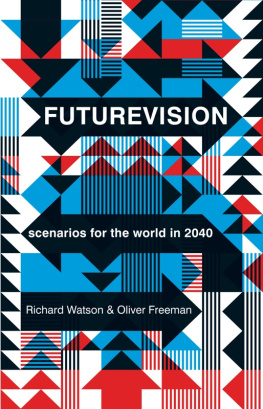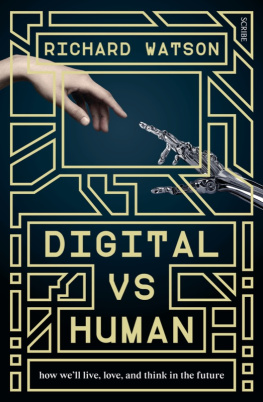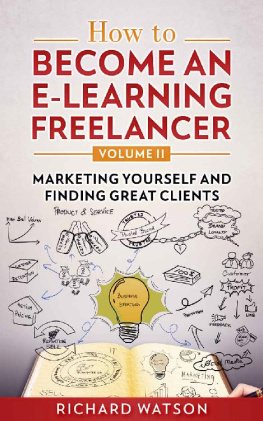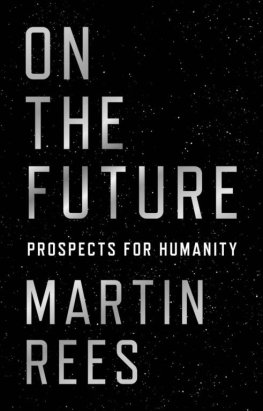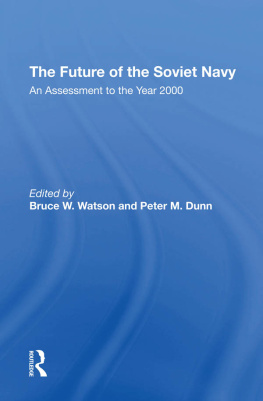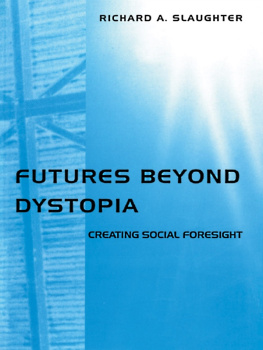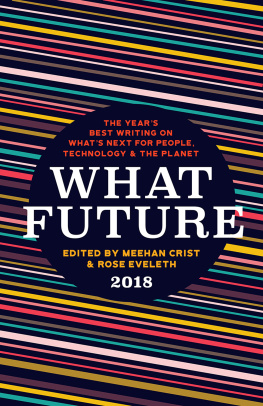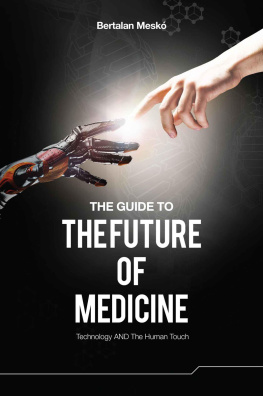
Scribe Publications
FUTUREVISION
Richard Watson is a writer, speaker, and strategist who works with leadership teams to challenge existing thinking about what is obvious or inevitable. He is also the founder and publisher of Whats Next , a website that documents global trends, and the co-founder, with Oliver Freeman and Andrew Crosthwaite, of Futures House Europe, a specialist scenario-planning consultancy. Richard is the author of the bestselling book Future Files (Scribe), which has been translated into 14 languages. He lectures regularly in London Business Schools Executive Education programmes.
Oliver Freeman is a career publisher and the joint chairman of Third Millennium Publishing Australasia. He is also the co-founder, futurist, and leading scenario planner at the Neville Freeman Agency. Oliver has chaired boards for the Copyright Agency, Viscopy, Publish Australia, and UNSW Press, and is a co-founder of digital companies eBooks.com, Leagle, The Larrikin Post, and homepageDAILY. He is an adjunct professor at the University of Technology Sydney Business School, and has worked extensively with Richard on various scenario-planning projects.
For Napier Collyns, co-founder of the Global Business Network, without whom we would never have met and our futures would have been quite different.
For Wayde Bull and Sandy Belford, who worked with us on the first version of the Worldview Scenarios.
For Richard Bawden, whose expertise and words on systems thinking and scenario learning have been so critical to us.
And for Georgie and Susie, for everything else.
Scribe Publications Pty Ltd
1820 Edward St, Brunswick, Victoria, Australia 3056
Email: info@scribepub.com.au
First published by Scribe 2012
Copyright Richard Watson & Oliver Freeman 2012
All rights reserved. Without limiting the rights under copyright reserved above, no part of this publication may be reproduced, stored in or introduced into a retrieval system, or transmitted, in any form or by any means (electronic, mechanical, photocopying, recording or otherwise) without the prior written permission of the publishers of this book.
National Library of Australia
Cataloguing-in-Publication data
Watson, Richard, 1961-
Futurevision: scenarios for the world in 2040 / Richard Watson; Oliver Freeman.
9781922072009 (e-book.)
1. Forecasting. 2. Social prediction.
Other Authors/Contributors: Freeman, Oliver.
303.49
www.scribepublications.com.au
Contents
1 : why scenario planning?
2 : introducing the four futures
3 : a world of intelligence
4 : a world of greed
5 : a world of temperance
6 : a world of fear
: early warning indicators
7 : the role of foresight
8 : introducing the four stages
9 : the first stage
10 : the second stage
11 : the third stage
12 : the fourth stage
: strategic shocks ten game-changers for 2040
Call it the resilience gap. The world is becoming turbulent faster than organizations are becoming resilient.
Gary Hamel and Liisa Vlikangas
Introduction
People have always been curious about what lies over the horizon or around the next corner. Books that speculate about the shape of things to come, especially those that make precise or easily digestible predictions, are consistently popular. But lately, the number of books seeking to uncover or explain the future has exploded. The reason for this which, ironically, no futurist appears to have foreseen is that rapid technological change and historic political and economic events have combined to create a climate that is characterised by uncertainty, and there is much anxiety about how civilisation may develop.
The world today offers more promise than ever before, but there are also more threats to our continued existence. During the writing of this book, for example, we saw the sudden collapse of Egypts Mubarak regime, and the domino effect it had on the Middle East; the emerging recession in parts of the United Kingdom; the economic plights of the PIIGS (Portugal, Italy, Ireland, Greece, and Spain); the perpetration of medieval atrocities in Syria; and the explosive success of the iPad, which sold almost 12 million units in the first economic quarter of 2012. Thats not to mention attacks on confidential government and commercial data, the discovery of a Higgs bosonlike particle, and the alleged detection of particles travelling faster than light, which is supposedly impossible (it was later revealed to be an error, but you never know what else may be found with time).
In short, the future is not what it used to be, and it needs rescuing. There is now a high degree of volatility in everything from politics and financial markets to food prices, sport, and weather, and this is creating unease especially among generations that grew up in an era which was characterised, with hindsight, by relative stability and simplicity; in a world that was more like Downton Abbey than Cowboys & Aliens .
There is a problem with most books about the future and indeed, there is a fatal flaw with almost all of our thinking about what will happen next. This is because of a simple point. The fact is, there is no single future, regardless of our deepest desire that it be so, and there is no heavenly salvation in sight.
Our views about the world change regularly. We know that the present is highly uncertain, and we are even starting to question what happened in the past (at a recent futures summit in Provence, France, Grigory Yavlinsky, the former presidential candidate, admitted to us that the most uncertain thing about Russia was its past). Logically, if the past and present are uncertain, the future will be, too. And if the future is uncertain, there must be more than one possible future.
There are always many different ways in which a series of events might unfold, so suggesting, as many futurists and technologists do, that there is one specific, inevitable future to come is not only inaccurate it is also dangerously misleading. What is even worse is when the two of us, as futurists, are presented with several possible futures and asked to decide which is more likely to occur. Linear analysis the extrapolation of current events to the future is a very straight road that doesnt allow for the unforeseen shocks that come from all sides. As the historian Niall Ferguson has observed: It is an axiom among those who study science fiction and other literature concerned with the future that those who write it are, consciously or unconsciously, reflecting on the present. Or, as we like to say: all futures are contemporary futures, in the same way that all prediction is based upon past experience.
This is one reason why so many predictions about the future go so horribly and hilariously wrong. For example, an article in The Times in 1894 suggested that every street in London would eventually be buried under nine feet of horse manure. Why? London was rapidly expanding, and so was the amount of horse-drawn transport. Londoners would, it seemed at the time, soon be up horse-manure creek without a paddle. What the author of this prediction didnt foresee, of course, was that at exactly this time engineer Karl Benz was developing the horseless carriage in Germany, and the new invention would change everything.
Four years later, in 1898, Benz made exactly the same mistake of extrapolating from the present. He predicted that the global demand for automobiles would not surpass one million. Why? Because of a lack of chauffeurs! The automobile had been invented, but the idea of driving by oneself had not. Thus it seemed inevitable that the world would eventually run out of chauffeurs, meaning that the manufacture of the automobile would come to the end of the road.
Next page
